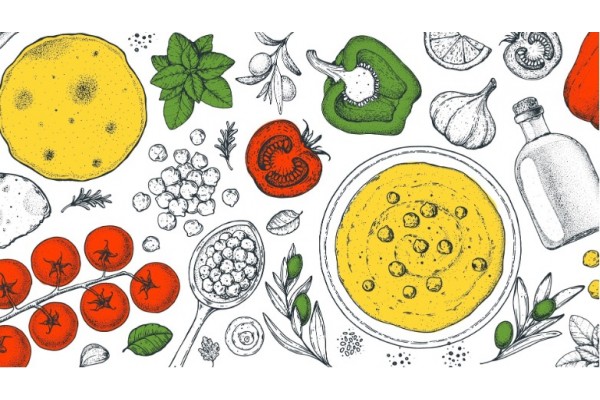Mediterranean diet linked to greater biodiversity and food security, study finds
April 6, 2023
Source: drugdu
 398
398
Dr. Priyom Bose, Ph.D.
By Dr. Priyom Bose, Ph.D.Apr 5 2023
Reviewed by Danielle Ellis, B.Sc.
To combat the double burden of non-communicable diseases and climate change, adopting sustainable and healthy diets and transitioning to sustainable food systems is essential. To support food security and sustainable development, the Mediterranean diet (MD) has been widely recognized as a healthy nutrition and biodiversity resource. A recent Advances in Nutrition study explored biodiversity and analyzed food-plant diversity differences between the Western diet and the MD.

Background
The global population is expected to rise to 10.9 billion by the end of the century. The Food and Agriculture Organization (FAO) estimates that food production must increase by almost 50% to meet consumers’ demands. Rapid population growth is often considered a threat to sustainable development, as it stresses natural resources.
The existing agro-food system has also been cited as a key driver of climate change and environmental degradation. Expansion of agricultural land and the associated use of inputs could lead to natural resource depletion, fragmentation of habitats, and environmental degradation. One could argue that biodiversity is declining partly due to the existing practices and inputs used in the current conventional agricultural system.
The Mediterranean diet (MD) is predominantly plant-based and low in consumption of animal products. Contrary to the Western diet, it can address environmental and health concerns as well as mitigate biodiversity degradation. The MD has a low environmental impact and biodiversity conservation, prevents chronic diseases, decreases public health costs, and puts much less pressure on natural resources.
Related Stories
- Is adherence to a healthful plant-based diet associated with a lower mortality risk and chronic disease among UK adults?
- Study highlights potential of Africa's 'forgotten' food crops for climate resilience and nutrition
- Australian study finds Mediterranean diet meets nutrient requirements and cheaper than traditional Western diets
About the Study
The current study investigated biodiversity regarding food plant species and analyzed the Western diet and MD patterns. Specifically, it explored whether the dietary patterns in particular countries are affected by biodiversity in food plants.
A two-stage data selection scheme was employed for this study. The first stage involved a filtered search on the MEDUSA plant database. In this stage, data were collected on species used as food and food additives between January and February 2022. In the second stage, the Euro+Med plant database was used to obtain information on the geographical location of different species, subspecies, landraces, and varieties. Overall, 449 species and 2,366 subspecies, varieties, and races were analyzed in this project. Data came from six Mediterranean countries and six countries from the rest of Europe, representing the Western diet.
Key Insights
Italy was observed to have the most diverse cuisine in both native and majorly cultivated food plants compared to the other countries. Denmark showed the lowest diversity in food plants. Compared to the Western diet group, countries with MD had a higher average of both majorly cultivated and native food plants.
It was observed that the mean of majorly cultivated food plant races, varieties, species, and subspecies in the MD sample was markedly higher than the Western diet counterpart sample. The greater diversity in food plants in the MD countries was attributed to crop utilization rather than crop availability.
The findings further highlighted the greater agricultural biodiversity in the MD region. They further show the richer diversity in varieties, races, species, and subspecies in the MD region, compared to the Western diet region. This is consistent with recent research linking biodiversity and sustainable diets, especially MD.
Limitations and Future Research
Although the current study used a two-stage process to collect data from large and valid databases, some limitations in the data continue to exist. For example, the information on restraints in food plant accessibility was missing, owing to limitations in the food value chain, such as cultivation practices, seasonal shortages, and price increases. Future research should carefully consider these parameters to present a more holistic picture of the association between diet in the agro-food system and biodiversity.
A key question that future research should explore is whether food imports and exports can affect food choices and the decision to adopt sustainable eating habits. The current study also focussed on a limited number of countries, which should be broadened in subsequent research to enhance the validity of the findings documented in the current study.
Conclusions
Consistent with previous research, this study showed that the agricultural biodiversity and the diversity in food plant varieties, races, species, and subspecies were higher in MD compared to Western-type dietary patterns. Further, this higher diversity stemmed from crop utilization, not food plant availability in the MD region. The results also imply that adopting a more diverse diet could assist in establishing a more biodiverse environment and reduce the harmful effects of climate change in the long run.
Journal reference:
- Mattas, K. et al. (2023) Assessing the interlinkage between biodiversity and diet through the Mediterranean diet case. Advances in Nutrition, https://doi.org/10.1016/j.advnut.2023.03.011, https://www.sciencedirect.com/science/article/pii/S2161831323002806?via%3Dihub
Reference:
https://www.news-medical.net/news/20230405/Mediterranean-diet-linked-to-greater-biodiversity-and-food-security-study-finds.aspx
By editorRead more on
- The first subject has been dosed in the Phase I clinical trial of Yuandong Bio’s EP-0210 monoclonal antibody injection. February 10, 2026
- Clinical trial of recombinant herpes zoster ZFA01 adjuvant vaccine (CHO cells) approved February 10, 2026
- Heyu Pharmaceuticals’ FGFR4 inhibitor ipagoglottinib has received Fast Track designation from the FDA for the treatment of advanced HCC patients with FGF19 overexpression who have been treated with ICIs and mTKIs. February 10, 2026
- Sanofi’s “Rilzabrutinib” has been recognized as a Breakthrough Therapy in the United States and an Orphan Drug in Japan, and has applied for marketing approval in China. February 10, 2026
- Domestically developed blockbuster ADC approved for new indication February 10, 2026
your submission has already been received.
OK
Subscribe
Please enter a valid Email address!
Submit
The most relevant industry news & insight will be sent to you every two weeks.



